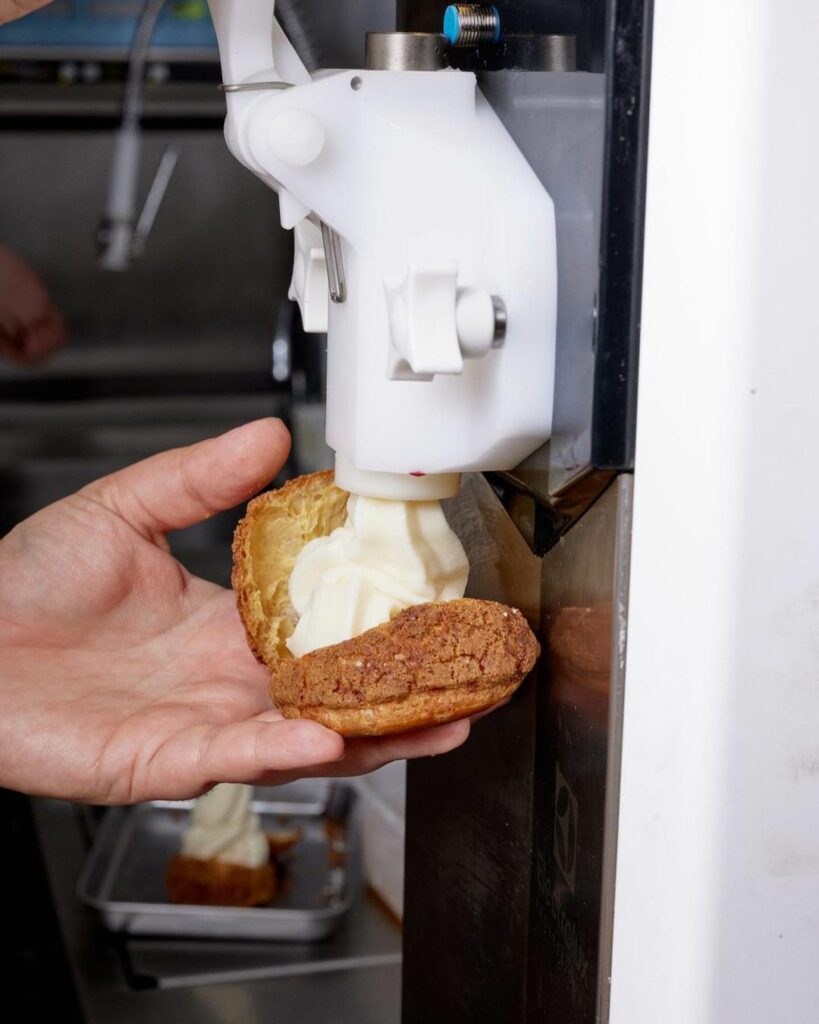PREPARING FOR THE WORST with TERRI AND RAV
The success of all pop-ups, supper clubs and events relies on really watertight planning. But life can be full of surprises, and the unexpected can really derail all of those best-laid plans. That’s something that Rav and Terri know all too well – they’re pop-up veterans, and their last event really tested all of their powers of agility and resourcefulness.
They wanted to share their insights with you so that you can ace your own pop-up – whatever life throws at you.
And what’s their biggest piece of advice? “Every single variable has a knock-on effect on everything else, costing time and/or money. When you’re doing your planning it’s so vital to factor in time for fuck-ups and a financial buffer to cover you when you need to spend money to fix things. You might think that you’re so prepped that you don’t need it. But people, shit happens! The best case scenario is that you don’t need any of it, and then you can make more money and have a more relaxed time on the day, which are both great outcomes”.

We can’t anticipate every single thing that might go wrong, but here are some ways that you can ensure you’re ahead of the game in some key scenarios.
THE ISSUE: STAFF CALL IN SICK
You’ve got just a couple of hours to go, and you receive the dreaded text – your vital support isn’t going to make it. That’s what happened to Rav and Terri, who found themselves three people down on the day. That cut their whole staff by 50%.
Terri remembers: “The day before I was checking stuff off the list and I thought, wow we look in great shape! But then we were so down on the day that we didn’t have the resources to stick to that schedule. In retrospect I could have done more prep in advance so that I wouldn’t have to rely on so many people on the day.”
THE FIX
Terri and Rav had to call in a bunch of favours to make up for those lost staff members, pulling in mates to work for free. That meant that they were still able to proceed, but remember that friends are likely to be less experienced and less familiar with the space, so things are likely to take longer.
That means it’s crucial to do as much prep as you possibly can in advance. Anything and everything that CAN be done beforehand, SHOULD be done beforehand. Leaving anything to the day eats into your precious “fuck-up time.”
Consider briefing your mates as a contingency plan, getting a sense of whether they’d be happy to help in an emergency, what their strengths are, and telling them what you would expect.

THE ISSUE: YOU’RE RUNNING LATE!
“There’s always a crunch moment where you feel that you have it under control – and then you’re suddenly like FUCK. We gave people a lot of choice, which made our lives more difficult. We got a bit carried away with all the awesome dessert ideas, which meant that the ordering was quite complex. Added to that our volunteers weren’t super experienced in service systems, so it ended up being a bit slower than we wanted”.
THE FIX
Make things as streamlined as possible, with a clear idea of both your customers’ experience AND your own experience, because the latter has a huge knock on effect on the former. When you’re menu planning, think in a really realistic way what’s going to be achievable within your capabilities, resources and environment. And think in advance what you’re going to do for people if they do have to wait – some nibbles and drinks on the table or in a queue will always make waiting a happy experience rather than an angry one.
Terri tells us what she and Rav did: “My mate Byron, who was helping out, started giving everyone in the queue cups of hot choccy and mulled cider, just to keep the heroes who turned out in the freezing weather warm and happy during the long wait times! That worked really well, but it did cost us money in terms of ingredients, labour, and lost sales as we were giving out things that they might otherwise have purchased.”
Rav and Terri factored that extra time and money into their planning, so they were covered. Make sure you do the same, and better still pre-plan the offering so that it doesn’t lose you sales.
THE ISSUE: YOU DON’T KNOW QUANTITIES
Judging how much to make is one of the hardest things. If you’re selling tickets in advance then obviously you’ll know pretty exact numbers by the time you have to buy your ingredients, plan your staffing etc. However if you’re doing something more ad-hoc, where you’re selling take-away or doing walk-ins, then it can be a bit of a finger-in-the-wind calculation. You can end up with a lot of wastage, or with a lot of disappointed customers – and neither of those are good for business.
Rav and Terri’s pop-up was take-away, and they ended up with a bit of wastage due to extreme bad weather. But they ensured that they kept checking interest in the run-up to the event, and so they were able to keep this to a minimum.
THE FIX
Terri and Rav gauged interest by putting survey stickers on their Instagram stories, encouraging people to click to show whether they were coming and then making a calculation based on those numbers. If you do a survey to register interest, bear in mind that the numbers aren’t exact – you’re going to need to recalibrate those figures based on other circumstances. Have you had press or post shares that might bump up the attendees? Are there planned transport issues which might have an impact, or weather which might deter people from queuing?
Try to turn an early sell-out to your favour – it means you’re popular, so capitalise on that success! Can you give people who missed out early bird access to your next event, or a special discount code, to make them feel special and cared-for? That will build up loyalty.
And, in anticipation that you might have surplus, it’s a great idea to forge a relationship with a local food bank so that any leftovers don’t end up going in the bin – you can speak to them beforehand to tell them what you’re doing, as well as checking what they need from you in terms of labelling, packaging etc.

THE ISSUE: ACTS OF GOD
Insurance companies define ‘Acts of God’ as natural events outside of your control where no blame can be attributed. There might be other things that are outside your control too – train strikes, road blocks, building work and more. When Rav and Terri held their pop-up they woke up on the morning of their event to sub-zero temperatures. Their event was take-away from Terri’s open arch with a queue outside, so the weather really mattered. But they made it work.
Terri remembers: “We had to spend loads of time putting up gazebos and heaters. We pulled in all our labour resources to get that done, and we were glad that we’d factored in that time. It was essential to making our customers have a good experience”.
THE FIX:
These might be completely outside of your control, but you can still control the outcome to some extent. Check the weather forecast and, based on the nature, structure and season of your event, make sure you’ve got everything in place for a worst-case scenario. Will people queue, and if so can you give them cover? How much is that going to cost in terms of potential hire and labour? Rav and Terri already had that equipment to hand, but if you don’t you might have to build a hire charge in to your costs.
If you can’t arrange cover, can you find some other way of caring for your customers, like emailing them a forecast beforehand to remind them to bring an umbrella? Emailing people beforehand is a good shout for any and all other issues, too – giving people alternative transport options, letting people know how to find you if the access is tricky and more. It has the added benefit of reminding people to turn up, too!

THE TAKE-AWAY:
The biggest learning is that every single decision you make, every single unexpected happening whether that’s inside or outside of your control, will have a knock-on effect in terms of wages, wastage, sales or additional costs. Everything is cause and effect and the more you plan in buffers for error, the more protected you will be.
- Make sure your financial model factors in every element of your expenditure, with a good buffer for worst case scenarios. You can use our spreadsheet here to plan yours.
- You can’t anticipate every scenario, but you can factor in time and money to account for the unexpected.
- Have a ‘just in case’ worst case scenario plan for staffing, with mates briefed if they need to be drafted in at the last minute.
- Prep everything possible as far in advance as possible
- Check for external circumstances such as weather, transport disruption etc.
- Email people a day or so beforehand to give them all the information they might need
- Gather as much data as possible in advance – whether that’s attendee surveys on instagram, or dietary information.
- Make sure that your menu suits your environment and your capabilities in terms of space, staffing, and the experience you want to deliver.
